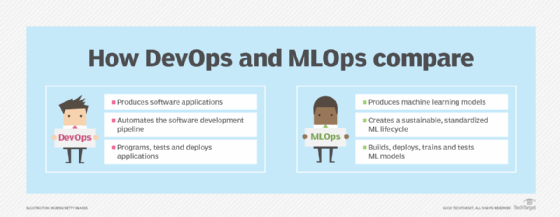
Getty Images
MLOps vs. DevOps: How are they different?
DevOps and MLOps share common goals -- but managing machine learning models brings a whole new set of challenges.
DevOps is an approach to designing, developing and deploying software applications generally, while MLOps focuses specifically on machine learning models.
That, in a nutshell, is the main difference between MLOps and DevOps. But there's more to the story, especially because MLOps introduces novel requirements -- such as managing data versioning, handling model drift and retraining models -- that don't apply to most other DevOps contexts.
To fully understand how MLOps and DevOps compare, let's define each term and explore their similarities and fundamental differences.
What is DevOps?
DevOps, a combination of the words development and operations, is a software development approach emphasizing close collaboration between developers, who design and write software, and IT operations, who deploy and maintain it. DevOps applies to all types of software development scenarios, guiding development strategy regardless of an application's function or design.
DevOps gained widespread popularity over a decade ago, promising greater efficiency and reduced risk. By working together, developers and IT engineers can better anticipate each other's needs. For example, developers can use feedback about IT engineers' challenges to improve applications and simplify management. In turn, knowing which changes developers plan to roll out enables IT teams to better support those updates.
What is MLOps?
MLOps, short for machine learning operations, is a set of practices designed to streamline the development, deployment and management of machine learning models.
The term MLOps appears to have originated in a 2015 academic paper. At that time, the DevOps movement had already spawned offshoot approaches, like DataOps and CloudOps. It seemed logical to think of machine learning development as another process that could benefit from a similar methodology.
MLOps unifies the workflows required to create machine learning models:
- Designing models by determining the appropriate algorithms and data needs.
- Preprocessing to improve data quality and accuracy before training.
- Training the model using the preprocessed data.
- Evaluating the model's performance after training.
- Refining the model to correct shortcomings and optimize behavior.
- Deploying the model to an environment where users can interact with it.
- Retraining the model or further refining it over time.

Similarities between MLOps and DevOps
MLOps is modeled after DevOps in that both practices share specific goals, concepts and methodologies. Their main similarities include the following:
- Focus on efficiency. Both aim to make complex processes more efficient and consistent: software development in DevOps, and model development in MLOps.
- Use of automation. Both encourage automation to reduce manual effort and the risk of error.
- Multiple stakeholders. Both cater to the needs of diverse stakeholders -- mainly developers and IT engineers in DevOps, and data scientists and ML engineers in MLOps.
- Repeatability. Both aim to make technical processes iterative and reproducible.
MLOps vs. DevOps: Key differences
However, despite their shared foundations, DevOps and MLOps differ significantly in focus and execution.
1. Scope and objectives
The most significant difference between DevOps and MLOps is their areas of focus. DevOps addresses the end-to-end lifecycle of all types of software applications, whereas MLOps focuses more narrowly on machine learning models.
Due in part to this difference in focus, the two approaches can coexist. In cases where an application incorporates both a software component and a machine learning model, teams might use DevOps in building the broader application and MLOps for managing the machine learning and AI components.
2. Stakeholders and skill sets
The stakeholders in DevOps are primarily software developers and IT operations engineers, whereas in MLOps, the main stakeholders are data scientists and developers or engineers specializing in machine learning. The primary skill sets associated with each practice are also distinct; for example, members of MLOps teams are likely to have specialized knowledge in statistics, data engineering and model evaluation.
But, again, overlap can occur. A machine learning development team might need to collaborate with IT operations when serving a model and managing it in production, for example.
3. Unique MLOps challenges
Special technical challenges arise when designing, training and deploying ML models:
- Data versioning. ML teams often need to track changes to training data over time.
- Model refinement. Tuning and iterating on models to improve performance is an essential process in many machine learning workflows.
- Model retraining. Teams often need to periodically retrain models as new data becomes available or as model performance degrades over time.
Most DevOps teams don't work extensively with training data or statistical evaluation; rather, they're focused on writing and deploying application code. Although they might tweak application functionality or refactor code before deployment, that's generally a simpler process than model refinement. The closest a DevOps team comes to the equivalent of model training is rewriting an application from scratch -- a rare practice that bears little resemblance to the unique process of model retraining.
4. Security implications and practices
Although security is not an explicit focus of DevOps or MLOps, organizations should consider security for software applications and machine learning models. This means that most DevOps and MLOps teams are asked to account for security and data privacy risks.
DevOps teams are primarily concerned with avoiding vulnerabilities in source code and securing third-party software components sourced through the software supply chain. In contrast, MLOps security focuses on anonymizing sensitive training data and building controls into models to prevent them from exposing private information to users.
Chris Tozzi is a freelance writer, research adviser, and professor of IT and society who has previously worked as a journalist and Linux systems administrator.







